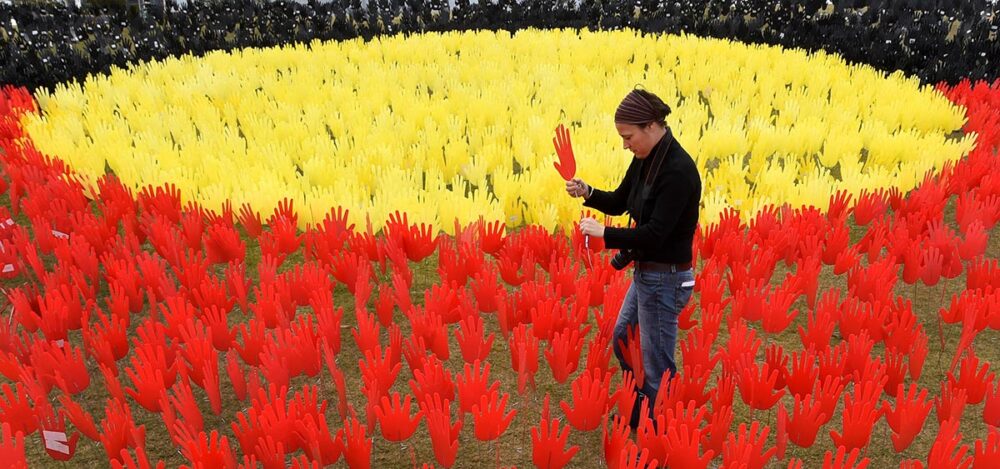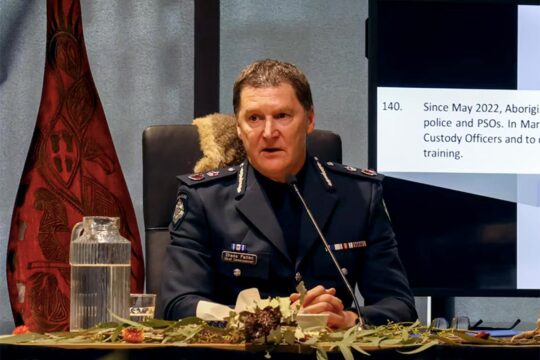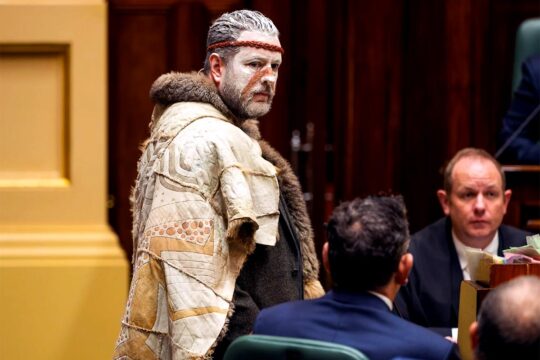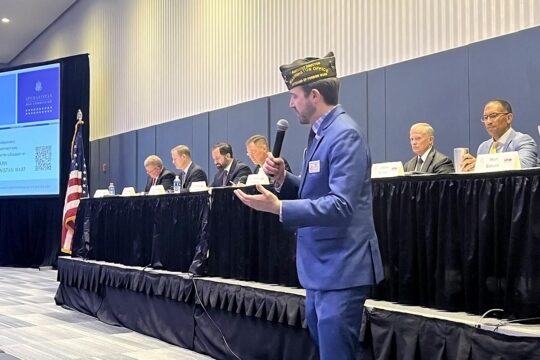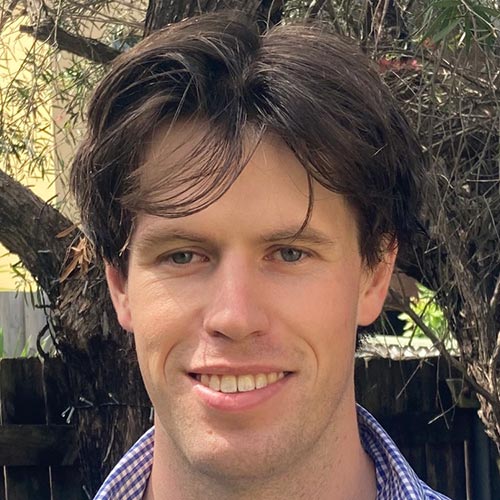The Yoorrook Justice Commission has called for the state of Victoria, southeastern Australia, to transfer decision-making power and control of criminal justice and child protection to First Peoples. The call came in September, as part of a suite of urgent recommendations made in a 445-page interim report, to reform the two systems that have revealed their bankruptcies and to give effect to self-determination through the negotiation of a Treaty.
However, in the wake of the October failure of Australia’s attempt to create, by referendum, an Indigenous Voice to parliament, state-based transitional justice efforts face a difficult political environment across the country.
The downward trend in the country seems to be gaining momentum. In Queensland, the state’s opposition Liberal National Party has withdrawn its support for a truth-telling and Treaty process ahead of an election it is expected to win next year. In New South Wales, Australia’s largest state, the government said the path to a Treaty would be “complex and tricky” after the referendum result, is reviewing its consultation process and has delayed its time frame.
Yoorrook Commission chair Professor Eleanor Bourke said that the referendum result made “truth-telling … more important than ever. Truth-telling can help us come together. We can listen to each other with respect and hope and healing.”
But to date, the Victorian government has not committed to implementing the Commission’s recommendations, and questioned the timeframe it was given to act.
Self-determination through a treaty
The Commission placed particular emphasis on the importance of self-determination in achieving systemic change for Victorian First Peoples. “Without [self-determination], government plans, strategies and programs will continue to fail,” it said.
The ongoing negotiation of a treaty with the Victorian government was cited as the vehicle through which self-determination in the criminal justice and child protection systems could be achieved. Formal negotiations for a state-wide treaty are expected to begin later this year.
The Commission stressed the importance of achieving substantive self-determination in accordance with the United Nations Declaration on the Rights of Indigenous Peoples, rather than mere consultation, or “handing the problem over to First Peoples at the service delivery level.” “Self-determination requires the transfer of decision-making authority, power and resources to First Peoples communities,” the Commission said.
The Commission said that the role of government was to enable self-determination, rather than to define its terms, and was critical of government witnesses’ emphasis on Indigenous-led service delivery and transfer of inter-departmental functions, rather than commitment to and understanding of fully-fledged self-determination.
Indeed, the call for self-determination faced dissent from opposition politicians after the report was handed down. Opposition Indigenous affairs spokesman Peter Walsh said that “I don’t think setting up a totally separate Aboriginal system in Victoria is necessarily the way forward … We need to work together to solve this.”
Child protection run by First Peoples
As part of its call for self-determination, the Commission broadly recommended that the Victorian government transfer “decision-making power, authority, control and resources” to First Peoples for the design, allocation of resources and oversight functions of the state’s child protection system.
Despite 19 inquiries into the child protection system in the last decade, and various new programs, the over-representation of Aboriginal children and young people in the system has worsened. Aboriginal children were 21.7 times more likely to be in out of home care in Victoria, and considerably more likely than non-Aboriginal children to be the subject of child protection investigations.
The number of First Peoples children in out of home care in Victoria increased from 922 to 2595 between 2013 and 2022, making Victoria the nation’s worst state on that measure.
The Commission drew a link between colonialism’s ‘logic of elimination’ and the child protection system. “Law and practices … have simply shape-shifted since the arrival of colonisers into present-day Victoria. These systems are described and understood as a continuation of the colonial project under which systemic injustice continues today,” the Commission said.
Systemic racism – affecting departmental assessment tools and decisions – and a lack of culturally appropriate support to young mothers were cited as reasons for the worsening overrepresentation in the system. Rates of reunification with family were considerably higher when cases were managed by Aboriginal Community-Controlled Organizations (ACCOs), leading the Commission to recommend increased involvement of and investment in ACCOs at all stages of the child protection system, from pre-birth reports to court hearings and reunification.
A key recommendation was for the establishment of a Commissioner for Aboriginal Children and Young People to provide oversight functions and advocacy on behalf of Indigenous minors concerning their treatment in the child protection system. The Commissioner would also be empowered to intervene in court proceedings involving the rights of Indigenous children.
Chair Eleanor Bourke said that the current child protection system was acting as a “pipeline to the justice system” for Aboriginal children before even being born.
A First Peoples-led police oversight division
Self-determination likewise formed the core of the Commission’s recommendations for reform of the criminal justice system. The Commission found that First Peoples were subject to racial profiling and over-policing, police were less likely to issue cautions to Aboriginal people, and that cultural awareness training for police was inadequate and contained offensive material.
Aboriginal men are 13.6 times more likely to be in prison, and Aboriginal women 13.2 times more likely than their non-Indigenous counterparts. Victoria’s harsh bail laws, which have since been amended, were found to have contributed to a 598 per cent rise in the number of Aboriginal men held on remand in the decade to June 2019. Rates of Aboriginal women on remand rose 475 per cent over the same period.
The Commission called for further action on bail laws, and for a cultural change action plan to ensure bail decision-makers use imprisonment on remand only as a last resort, and that bail hearings are made culturally safe for Aboriginal people.
The establishment of an independent police oversight authority (headed by someone who has not been a police officer) was a headline recommendation, with powers to investigate and rule on complaints about police, and to include a dedicated First Peoples-led division for complaints from Aboriginal Victorians.
The Commission also urged the government to go further on raising the age of criminal responsibility. In Victoria, the age of criminal responsibility stands at 10, with plans to raise it to 14 by 2027. Yoorrook recommended that the government complete that reform immediately, and prohibit the detention of children under the age of 16.
Professor Eleanor Bourke, the Commission’s chair, pointed to recent progress on public drunkenness laws, bail laws and the age of criminal responsibility as evidence that the truth-telling process was having an impact and forcing the government into change.
However, Bourke argued that lasting change could only be achieved through self-determination. “The most meaningful, transformative change needed is to embed genuine self-determination in Victoria’s child protection and criminal justice systems.”
A new phase on ‘Land, Sky and Water’
The Victorian government pledged to “look at each and every one of the [46] recommendations that have been made … Cabinet will have a proper deliberative process to work through line by line, recommendation by recommendation and we will report progress,” then-premier Daniel Andrews said on September 5. But crucially, the government did not commit to implementing the recommendations, and said the 12-month timeframe given by the Commission was “challenging”.
However, without waiting for the government , the Commission is now set to begin the next phase of its truth-telling inquiry, and is inviting submissions on ‘Land, Sky and Water’. This phase of the Commission will hear evidence on, among other things, the dispossession of land, the destruction of cultural knowledge and heritage, and ways to provide redress for ongoing injustice related to the taking of land and culture.


